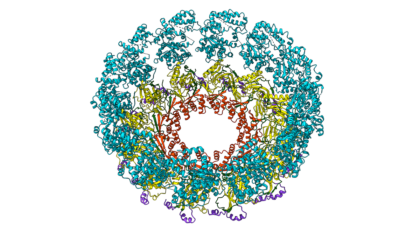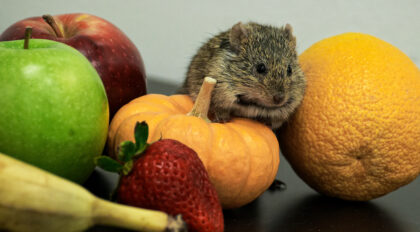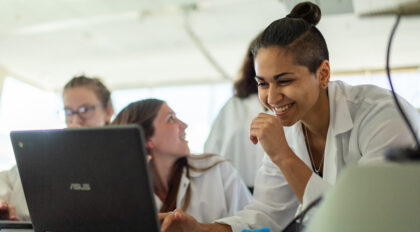Brad’s Update
Spring is in the air and here at the Morgridge Institute, it is both the season of spring and new beginnings. You may notice a new design for this biannual newsletter, and I hope you enjoy the updated look and feel.
In just a few weeks, we will be congratulating and honoring the undergraduate and graduate students finishing their programs and moving on to the next chapters in their careers and lives.
We are also in the final stages of welcoming new outstanding scientists to the institute and expanding our life-changing programs in outreach and education. Both of these changes usher in the next chapter in the Morgridge Institute and are made possible by you.
We are all in a season of new beginnings. As a society, we continue to emerge from the COVID-19 pandemic. It’s wonderful to see scientists, students, and collaborators navigating in-person, hybrid, and remote work to push science forward.

Brad Schwartz
We also remain steadfast in our support for raising up the next generation of scientists, like Danielle Desa, a postdoctoral fellow in the Melissa Skala Lab. Danielle, like many postdocs here, is an early-career researcher. And your support is vital to helping train and nurture the next generation of scientists. We also want to ensure that we have a culture of excellence and inclusiveness and a place where people care for one another. We are not going to make this process about accumulating prestige or status. We want not only the best possible scientist but the person most likely to make major advances because they are here instead of somewhere else.
In this report, you can learn more about the progress Morgridge scientists are making in many avenues of biomedical science and health. Fundamental research is a catalyzing force in discovery — and
you can read about two avenues of exciting research: one continues our pathbreaking work to understand how viruses replicate — and stop them, and the other seeks to establish a new model animal (the Nile rat!) in diabetes research.
All of this work is made possible by YOU. Thank you for being part of our continued progress in science and discovery — and raising up the next generation.
I hope you enjoy this report. Thank you for helping scientists improve human health. We can’t do this work without you.
Brad Schwartz, M.D.
CEO, Morgridge Institute for Research
P.S. What’s on the cover? You’ll see Danielle Desa, a postdoctoral research fellow, who is working on a project that combines microscopy and stem cells with the potential to deliver better heart disease therapies.
As a donor, you are:
Exploring Science, Fearlessly
Donors like you help scientists pursue fearless science. Thank you for supporting biomedicine that will improve human health. With your support, you’re helping fight disease, understand the depths of biology, unlock ways to stop cancer, HIV, and many more disorders.
Changing Lives
Science is for everyone. You help many free and heavily-discounted science education and outreach programs for underserved children and families. From afterschool programs to the Summer Science Camp, these opportunities bring the wonders and joy of science to all families.
Milestones
You play an important role in pushing science forward. Thanks to private support from donors like you, the Morgridge Institute is working to improve human health. We can’t do this work without you—THANK YOU.
Here’s a look at some of the milestones made possible by you.

Photos: How Sea Spiders and Other Creatures Could Unlock the Secrets of Tissue Regeneration
Many animals have the ability to regrow limbs and other body parts after injury. A Wall Street Journal photo essay explores scientific inquiries into these amazing creatures — including the work of Melanie Issigonis in the Phil Newmark Lab at Morgridge.

Stunningly detailed blueprint revealed of viral genome replication machinery
Morgridge virologists have outlined in atomic detail the intricate RNA replication machines that coronaviruses create inside infected cells, giving rise to potential new strategies to fight disease.

Genome sequencing supports Nile rat animal model for diabetes research
For the first time, researchers have assembled a high-quality reference genome for the Nile rat, a promising model organism for diabetes research.

Desa named inaugural Melita F. Grunow Postdoctoral Fellow
Danielle Desa seeks to break ground in imaging design and stem cell research with support from the new Melita F. Grunow Postdoctoral Fellowship. She is mentored by Morgridge Investigator Melissa Skala and Biomedical Engineering Professor William Murphy.

The 2022 winners: Cool Science Image Contest
A team of scientists including graduate student Julia Gambardella, Morgridge scientist John Maufort, and UW–Madison Professor Marina Emborg, were winners in the UW– Madison 2022 Cool Science Image Contest.
Science for All
When you establish a planned gift, you help inspire the next generation of scientists. Planned gifts through an estate or annuities help support science education and outreach activities, like the Summer Science Camp.
Contact Bill Swisher, Chief Development Officer, today.
bswisher@morgridge.org
(608) 316-4364
